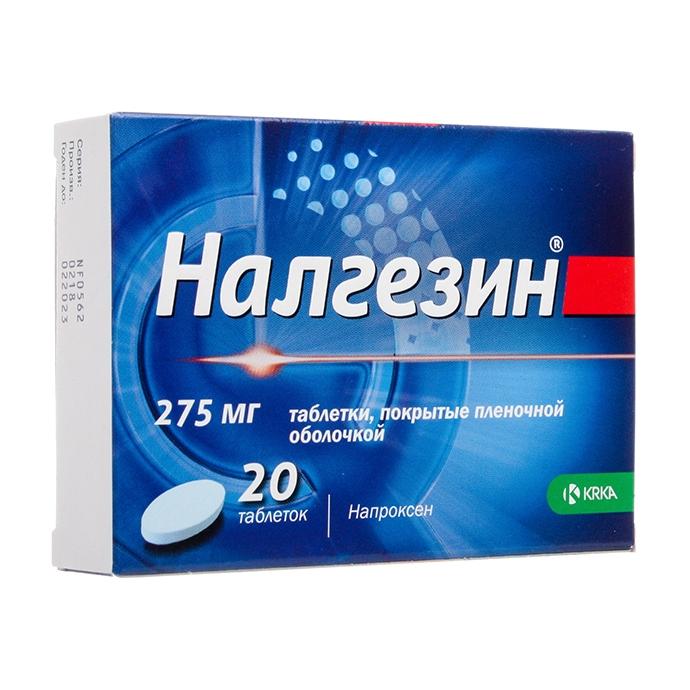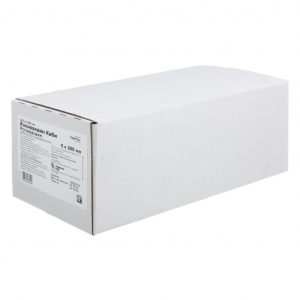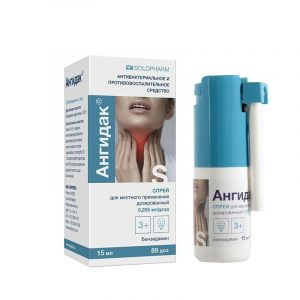Description
release
tablets, film-coated
packaging 20 pcs
Pharmacological action
Pharmacotherapeutic group:
non-steroidal anti-inflammatory drug (NSAID).
ATX:
nalgesin, is a naproxen preparation, has analgesic, antipyretic and anti-inflammatory effects. The mechanism of action is associated with non-selective inhibition of the activity of cyclooxygenase 1 and 2 (COX-1, COX-2). Film-coated tablets, Nalgezin dissolve well, are rapidly absorbed from the gastrointestinal tract and provide a rapid onset of analgesic effect.
Pharmacokinetics:
Absorption from the gastrointestinal tract – fast and complete, bioavailability – 95% (food intake practically does not affect either completeness or absorption rate). The time to reach maximum concentration is 1-2 hours, the connection with plasma proteins is> 99%, the half-life is 12-15 hours. Metabolism is in the liver to dimethylnaproxen with the participation of the CYP2C9 enzyme system. Ground clearance – 0.13 ml / min / kg. It is excreted by 98% by the kidneys, 10% of them are excreted unchanged with bile – 0.5-2.5%. The equilibrium concentration is determined by taking 4-5 doses of the drug (2-3 days). With renal failure, cumulation of metabolites is possible.
Indications
Diseases of the musculoskeletal system (rheumatoid arthritis, psoriatic, juvenile chronic arthritis, ankylosing spondyloarthritis (ankylosing spondylitis) gouty arthritis, rheumatic soft tissue rheumatoid arthritis, vertebral arthritis, vertebral arthritis, and vertebral arthritis, .
Mild to moderate pain syndrome: neuralgia, ossalgia, myalgia, lumbar ischialgia, post-traumatic pain syndrome (sprains and bruises), accompanied by inflammation, postoperative pain (in
traumatology, orthopedics, gynecology, maxillofacial surgery, headache, Algodismenorea, adnexitis, toothache.
As part of the complex treatment of infectious and inflammatory diseases of the ear, throat, nose with severe pain (pharyngitis, tonsillitis, otitis media).
Feverish syndrome with colds and infectious diseases.
Nalgesin is used for symptomatic therapy (to reduce pain, inflammation and lower fever) and does not affect the progression of the underlying disease.
Contraindications
– Hypersensitivity to naproxen or naproxen sodium with anamnestic data on an attack of bronchial obstruction, rhinitis, urticaria after taking acetylsalicylic acid or other NSAIDs (full or incomplete syndrome of intolerance to acetylsalicylic nitric acid, – sulphuric acid, – The period after coronary artery bypass grafting
– Erosive-ulcerative changes in the gastric or duodenal mucosa, active gastrointestinal bleeding
– Inflammatory bowel disease, in the acute phase (ulcerative colitis (ULC), Crohn’s disease)
– Cerebrovascular bleeding or other bleeding and hemostatic disorders
– Severe liver failure or active liver disease
– Severe renal failure (creatinine clearance less than 20 ml / min), including confirmed hyperkalemia, progressive renal disease – hematopoiesis
– Pregnancy, breastfeeding
– One tablet of Nalgesin contains 275 mg of naproxen, so the drug is not recommended for children under 9 years of age and / or weight m of less than 27 kg.
Precautions:
Coronary heart disease, cerebrovascular disease, congestive heart failure, dyslipidemia / hyperlipidemia, diabetes mellitus, peripheral arterial disease, smoking, creatinine clearance less than 60 ml / min. Anamnestic data on the development of ulcerative lesions of the gastrointestinal tract (GIT), the presence of Helicobacter pylori infection, old age, prolonged use of NSAIDs, frequent alcohol consumption, severe somatic diseases, concomitant therapy with the following drugs: anticoagulants (e.g. warfarin), antiplatelet agents (e.g., acetylsalicylic acid, clopidogrel), oral glucocorticoids (e.g., prednisone), selective serotonin reuptake inhibitors (e.g., citalopra , Fluoxetine, paroxetine, sertraline). To reduce the risk of developing adverse events from the gastrointestinal tract, the minimum effective dose should be used with the lowest possible rate. For children from 9 to 12 years of age, the drug is prescribed only on the recommendation of a doctor.
Use during pregnancy and lactation
Contraindicated in pregnancy and lactation.
Composition
1 film-coated tablet contains:
CORE
Active ingredient: naproxen sodium 275.00 mg
Excipients: povidone 12.0 mg, microcrystalline cellulose 97.00 mg, talc 15.0 mg, 3 mg magnesium , purified water 18.00 mg
SHELL
Dye Opadry YS-1-4215 15.00 mg Opadray YS-1-4215 – this ready-to-use mixture of titanium dioxide (E171), macrogol, indigo carmine E132 and hypromellose, weighed together .
Dosage and Administration
Inside. The tablets should be taken with enough water. Strictly follow the doctor s instructions. You should not stop treatment or change the dosage without first consulting your doctor.
Check with your doctor for the duration of use of the drug.
The usual daily dose used to relieve pain is 2-4 tablets (550 to 1100 mg).
In case of very severe pain and no history of gastrointestinal diseases, the doctor may increase the daily dose to 6 tablets (1650 mg), but not more than 2 weeks.
When using the drug as an antipyretic, the initial dose is 2 tablets of Nalgesin, then 1 tablet of Nalgesin (275 mg) is taken every 6-8 hours.
2 tablets (550 mg) twice daily are recommended to prevent migraine attacks. However, treatment should be discontinued if the frequency, intensity and duration of migraine attacks do not decrease within 4-6 weeks. At the first sign of a migraine attack, you should take 3 tablets (825 mg), and if necessary, another 1-2 tablets (275 – 550 mg) after 30 minutes.
To relieve menstrual cramps and cramps, pain after the introduction of the IUD (intrauterine device) and other gynecological pains, it is recommended that the drug be administered in an initial dose of 2 tablets (550 mg), then 1 tablet (275 mg) every 6-8 hours.
In an acute attack of gout, the initial dose is 3 tablets (825 mg), then 2 tablets (550 mg) after 8 hours, and then 1 tablet (275 mg) every 8 hours until the attack stops.
For rheumatoid diseases (rheumatoid arthritis, osteoarthritis and ankylosing spondylitis), the usual initial dose is 2-4 tablets (550-1100 mg), twice daily in the morning and evening. An initial daily dose of 3 (825 mg) – 6 tablets (1650 mg) is recommended for patients with severe night pain and / or severe morning stiffness, patients who are being treated for sodium naproxen with high doses of other non-steroidal anti-inflammatory drugs, and patients whose pain is the leading symptom. Typically, the daily dose is 2 tablets (550 mg) – 4 tablets (1100 mg), administered in two divided doses.
Morning and evening doses may not be the same. With the consent of the attending physician, you can change them depending on the prevalence of symptoms, i.e. night pain and / or morning stiffness.
Children over 9 years old and / or weighing more than 27 kg are recommended a daily dose of 10 mg / kg in 1-2 doses.
If you have the impression that the effect of the drug is very strong or weak, inform your doctor or pharmacist.
Side effects of
Side effects are most common when using high doses of nalgesin:
– from the digestive system: constipation, abdominal pain, dyspepsia, nausea, diarrhea, ulcerative stomatitis, erosive and ulcerative lesions and bleeding of the gastrointestinal tract, increased activity of liver enzymes, impaired liver function, jaundice, bloody vomiting, melena
– from the central nervous system: hearing loss, dizziness, headache, drowsiness, depression, sleep disturbance, impossibility concentrate, insomnia, malaise, myalgia and muscle weakness, slowing down the reaction rate, aseptic meningitis,
cognitive dysfunction – from the skin: itching, ecchymosis, excessive sweating, purpu RA, alopecia, photodermatosis
– from the organs: tinnitus, impaired vision, hearing impairment
– from the cardiovascular system: swelling, shortness of breath, palpitations, congestive heart failure, vasculitis
– from the genitourinary system: glomerulonephritis, , interstitial nephritis, nephrotic syndrome, renal failure, renal papillary necrosis,
menstrual irregularities – from the hematopoietic organs: eosinophilia, granulocytopenia, leukopenia, thrombocytopenia, aplastic anemia
– from the respiratory system: eosinophilic pneumonia: urticaria, angioedema, epidermal necrosis, erythema multiforme, Stevens-Johnson syndrome
– others: thirst, hyperthermia, hyperglycemia, hypoglycemia, hemolytic anemia
If you notice such phenomena, stop taking the drug and, if possible, consult a doctor.
Drug Interaction
When treated with anticoagulants, it should be borne in mind that
naproxen may increase bleeding time. Do not use the drug at the same time as other NSAIDs (increased risk of side effects).
Patients, concomitantly receiving hydantoins, anticoagulants, or other drugs that bind significantly to plasma proteins, should monitor for signs of potentiation or overdose of these drugs.
Nalgesin may reduce the antihypertensive action of propranolol and other beta-blockers, and may increase the risk of renal failure associated with the use of ACE inhibitors. Naproxen inhibits the natriuretic action of furosemide. Inhibition of renal clearance of lithium leads to an increase in plasma lithium concentrations. The use of probenecid increases plasma levels of naproxen.
Cyclosporine increases the risk of kidney failure.
Naproxen slows the excretion of methotrexate, phenytoin, sulfonamides, increasing the risk of their toxic action.
Magnesium and aluminum-containing antacids reduce the absorption of naproxen.
Overdose
A significant drug overdose can be characterized by drowsiness, dyspeptic disorders (heartburn, nausea and vomiting, abdominal pain), weakness, tinnitus, irritability, in severe cases – bloody vomiting, melena, impaired consciousness, convulsions and renal failure).
Patients who have received accidentally or intentionally a large amount of the drug Nalgesin should wash their stomach and undergo symptomatic therapy:
activated charcoal, antacids, H2 receptor blockers, proton pump inhibitors. Hemodialysis is ineffective.
Storage conditions
In the dark place at a temperature of no higher than 25 ° C.
Expiration
5 years.
Deystvuyuschee substances
Naproxen
pharmacy leave terms without a prescription
Dosage form
dosage form
tablets
KRKA d.d. Novo mesto AO, Slovenia



